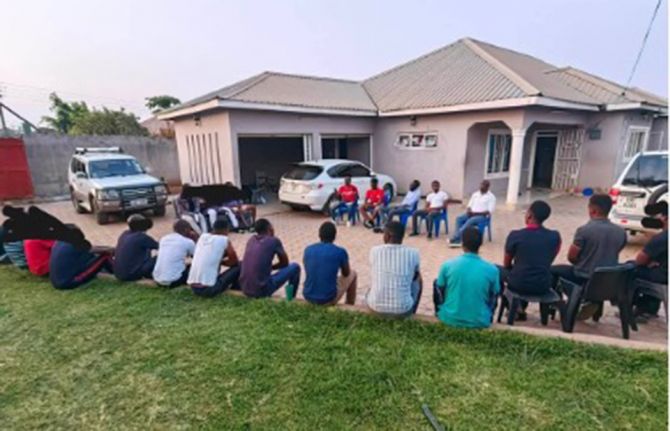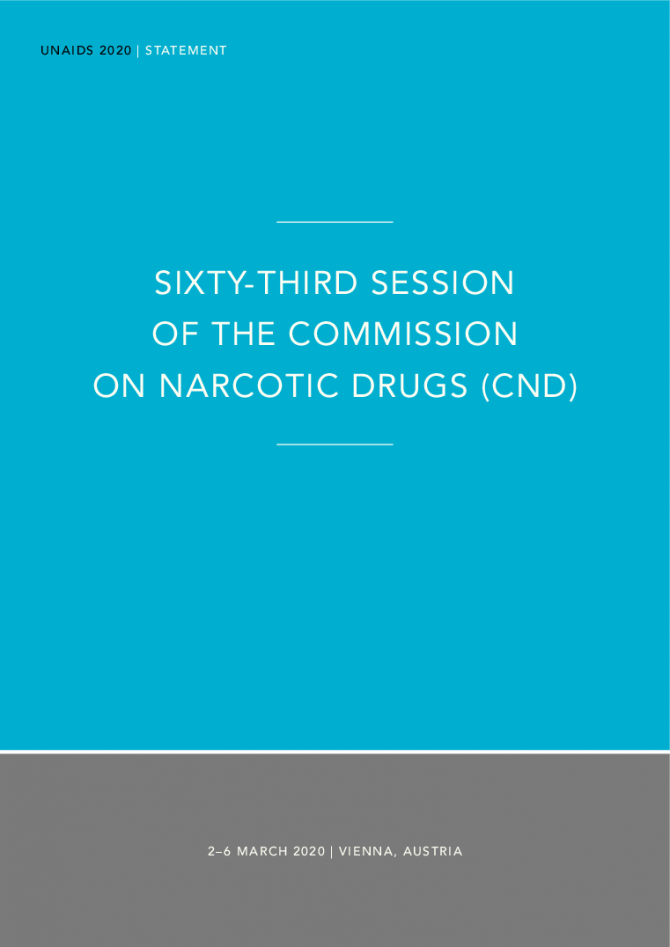
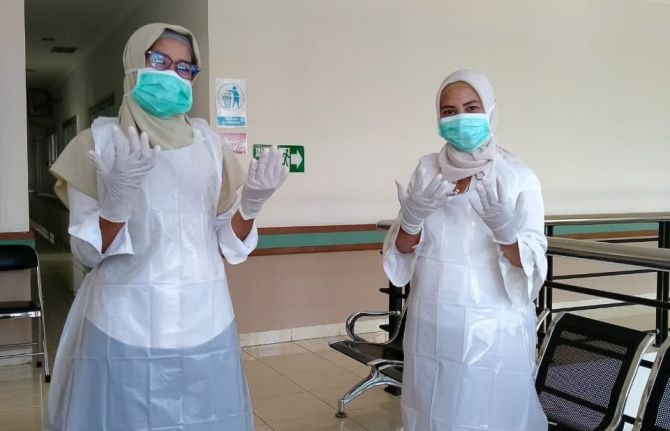
Feature Story
Paying tribute to care workers during an online Labour Day event
01 May 2020
01 May 2020 01 May 2020On 1 May 2020, the UNAIDS Executive Director Winnie Byanyima joined Oxfam Denmark to pay tribute to care workers during an online Labour Day event. Below are the transcripts of her video message.
Hello everyone!
It’s an honour to join you to celebrate 1 May—the international day of workers. In the time of COVID-19, it is our frontline workers in hospitals, community health centres, care facilities, supermarkets, taxis and delivery vans who are risking their lives for us.
Here in Geneva we clap for health workers and carers every evening at 9 p.m. to show our gratitude.
But this is not enough. We must value and fairly reward the work they do.
Women make up 70% of frontline health and care workers. Twenty-four million out of the 28.5 million nurses in the world are women, and they earn on average 28% less than their male counterparts. They are low paid and receive poor benefits. In developing countries, community health workers, mostly women, play a critical role in disease prevention, promoting healthy behaviours and linking community members to formal health centres. Community health workers are often women volunteers, getting no compensation from public health systems. What a gender injustice!
And guess what? The coronavirus is aggravating this injustice. It has been heartbreaking to watch TV images of nurses and doctors who died because they did not have personal protective equipment. We must protect our health workers and ask our governments to prioritize their safety.
Then there is unpaid care work, done mostly by poor women and girls in their households—raising children, feeding families, caring for the sick and the elderly and so on—work estimated to cost about US$ 11.5 trillion globally. The burden of unpaid care work denies women and girls education and economic opportunities, it undermines their well-being and other roles in society and, again, the coronavirus is making this worse. An African woman, who already walked on average 6 km a day to fetch water, now needs to fetch even more because of the virus.
So, as we fight this deadly virus, I say, let us tackle the old gender inequalities that are feeding on and aggravating it. Let us demand fair and equal pay for health and care workers, let us demand that they have the personal protective equipment they need. They are our heroes.
Let’s end exploitation of women by calling for the recognition, redistribution and reward of unpaid care work.
Workers of the world, let’s give value to what truly matters in life, and celebrate and justly reward all care workers.
Thank you!
Watch video message
Resources
Related

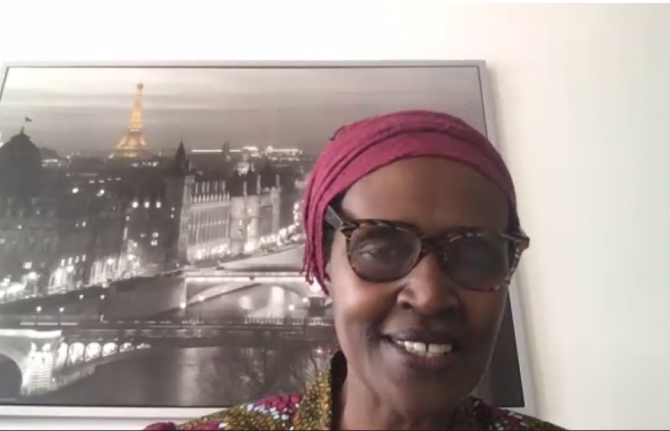
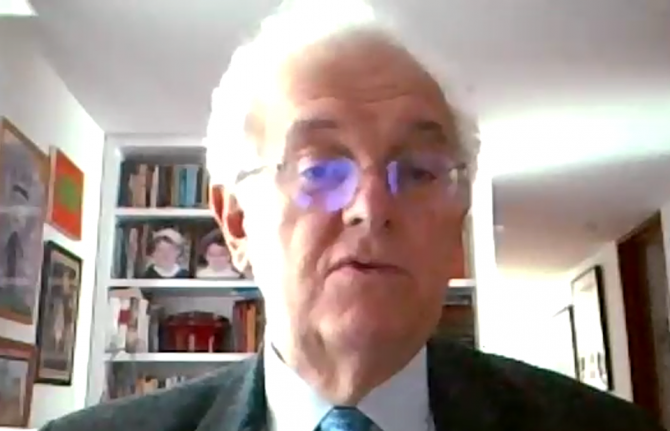

Press Statement
UNAIDS calls for increase in health spending and social protection as an essential part of the economic response to COVID-19
17 April 2020 17 April 2020UNAIDS Executive Director Winnie Byanyima’s statement on the economic response to COVID-19 during an online event held on 16 April 2020 cosponsored by the Global Development Policy Center and the United Nations Conference on Trade and Development
COVID-19 is killing people. However, the scale and the consequences of the pandemic are man-made.
It was not inevitable that there would be thousands of lives lost and millions of livelihoods destroyed. Those losses are the result of the extreme inequality that is hardwired into our global economy.
The steepness of the mortality curves, the depth of the economic losses and the social upheavals in different countries are the consequences of our policy choices, a function of the economic model that we have created.
COVID-19 has pushed the world into a recession. The International Monetary Fund is reporting that the great lockdown is going to be worse than the global financial crisis of 2008. According to the International Labour Organization, COVID-19 is expected to wipe out the equivalent of 195 million full-time jobs.
As we know from the HIV epidemic, epidemics wreak havoc in an unequal world. They feed off existing inequalities and hit the most vulnerable and marginalized the hardest—those who have no access to health care, who have no social safety net, who have no right to sick leave or who have no water with which to wash their hands. The people whose right to health is denied are those who are hit first and hit the hardest.
When governments prioritize privatized health-care systems over publicly funded universal health care they are making a choice, they are saying that the right to health becomes a privilege for the few who can afford it. When an epidemic hits, that choice translates into a decision about who will live and who will die. Those with the privilege of access to health care live, those without, die.
Governments must invest in universal social protection. In poor communities around the world, we are hearing: “If we cannot work, we will die of hunger before we get sick from the coronavirus.” This is a choice no one should have to make. This health crisis is rapidly becoming a food crisis.
Across our economy, we see business models that rely on workforces that are not protected. Models that exploit workers and suppliers, that do not support or protect them.
The climate crisis is another consequence of our rigged economic model, exploitative of the ecosystems on which we depend. And again, it is the poorest, those least responsible for the exploitation, who are the hardest hit. Right now in the Pacific, people are not only struggling against COVID-19 but are recovering from the aftermath of Cyclone Harold.
None of this is an accident. It is by design. Earlier, I said that we are living with man-made choices, and in many ways they are MAN-made. It is men who still dominate corporate boardrooms and the corridors of political power, while it is women who take the biggest burden of caring for others—women who must look after sick relatives in a pandemic or who walk further to find drinking water.
But the story is not all bleak. We are seeing some silver linings; some lessons are being learned. We are seeing more awareness of the importance of health and social protection. This means that if we are to recover, we must reset—we can’t go back to where we were.
We are seeing some countries imposing what they are calling solidarity taxes on big businesses and on wealthy individuals. We are hearing about cancellation of student debt, health fees being waived, including user fees, and more support for carers. This is a new agenda.
However, we are seeing other countries moving in a different direction—tax cuts for the rich, bailouts for big companies, without any guarantee that those bailouts are going to translate into support for the workers and suppliers on the ground. So, we are seeing different signals.
Health spending and social protection must be increased. This could be the basis for the rebuilding, not so that it’s not just a patch-up with bailouts.
We must come out of this crisis differently, with a determination to change the economic model. We need a Global Green New Deal, where the stimulus is invested in people and in the planet.
A new economic model that expands universal health coverage and universal social protection to all, that boosts decent work and pays decent wages, where the rewards are distributed across the whole supply chain and every stakeholder benefits equitably. And a model in line with the Paris Agreement on climate change.
We have a chance to make different choices and I am praying that world leaders will decide to make different choices.
UNAIDS
The Joint United Nations Programme on HIV/AIDS (UNAIDS) leads and inspires the world to achieve its shared vision of zero new HIV infections, zero discrimination and zero AIDS-related deaths. UNAIDS unites the efforts of 11 UN organizations—UNHCR, UNICEF, WFP, UNDP, UNFPA, UNODC, UN Women, ILO, UNESCO, WHO and the World Bank—and works closely with global and national partners towards ending the AIDS epidemic by 2030 as part of the Sustainable Development Goals. Learn more at unaids.org and connect with us on Facebook, Twitter, Instagram and YouTube.

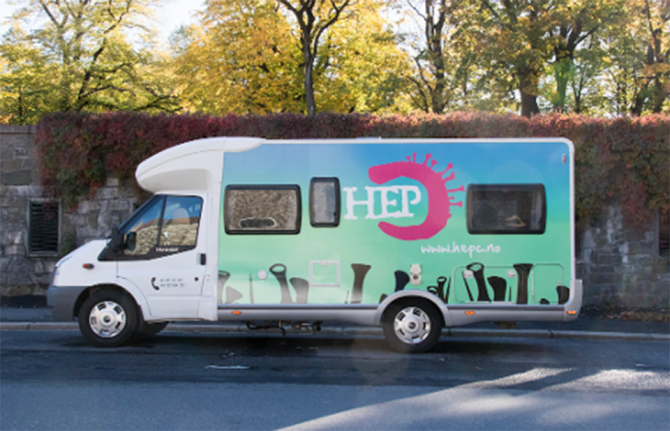
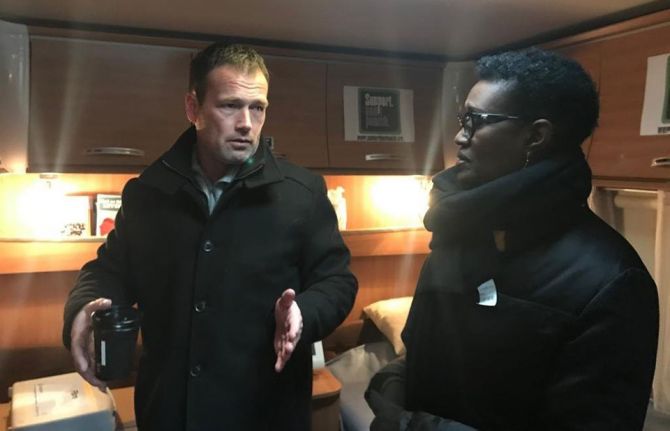
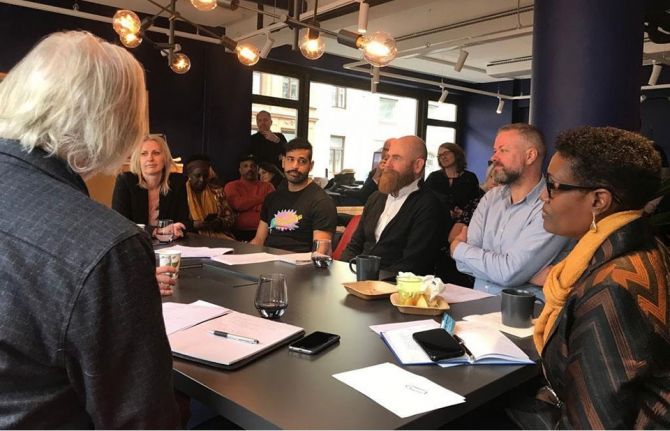
Feature Story
Norway’s community organizations ensuring health, dignity and rights
17 March 2020
17 March 2020 17 March 2020It was a very different morning bus ride for UNAIDS Executive Director Winnie Byanyima as she boarded the hepatitis bus in Oslo, Norway, to hear more about the work of ProLAR, an organization that supports people who use drugs. ProLAR provides a range of services, including opioid substitution therapy and testing for HIV and hepatitis C. It is also active in calling for changes in drug policy and promotes evidence-informed policy that involves the affected communities.
“We welcome people who use drugs into a warm, safe space. Here we can talk, get to know each other then take the necessary tests,” explained Ronny Bjørnestad, Managing Director of ProLAR.
According to the European Monitoring Centre for Drugs and Drug Addiction, around 9000 people who inject drugs lived in Norway in 2019, many in the two largest cities, Oslo and Bergen. In 2015, the Norwegian Government presented a new action plan addressing substance use and addictions that prioritizes prevention, early intervention, treatment and aftercare for people who use drugs. In 2018 the European Centres for Disease Control reported that there were only six new diagnosis of HIV among people who inject drugs in Norway.
Ms Byanyima also visited Sjekkpunkt, a free and anonymous testing service in Oslo for HIV and other sexually transmitted infections that caters for gay men and other men who have sex with men. Rolf Martin Angeltvedt, Director of Helseutvalget, said that, “Checkpoint does not say “no” to anyone who wants to come in to talk and take a test. We offer free, anonymous and rapid testing.”
New HIV infections among gay men and other men who have sex with men have been declining steadily in Norway in recent years. In Norway the most commonly reported mode of HIV transmission in 2018 was heterosexual transmission.
Following the visit to Sjekkpunkt, Ms Byanyima met with representatives of civil society organizations working in Norway on issues concerning people living with and affected by HIV. The dialogues centred around sex work, chemsex, ageing, youth, lesbian, gay, bisexual, transgender and and intersex people and migration. In Norway, civil society groups play a critical role in addressing the AIDS epidemic by supporting prevention, treatment and care efforts.
“The leadership of networks and peer-led organizations working to support people living with, and affected by, HIV is instrumental. More than ever, the role of civil society is critical to removing barriers to health, dignity and the enjoyment of human rights. I encourage you to build bridges with civil society organization in other regions of the world. We must work together to reverse the disturbing trend of shrinking space and lack of funding for civil society or we will fail to reach the target of ending the AIDS epidemic by 2030,” said Ms Byanyima.
Region/country

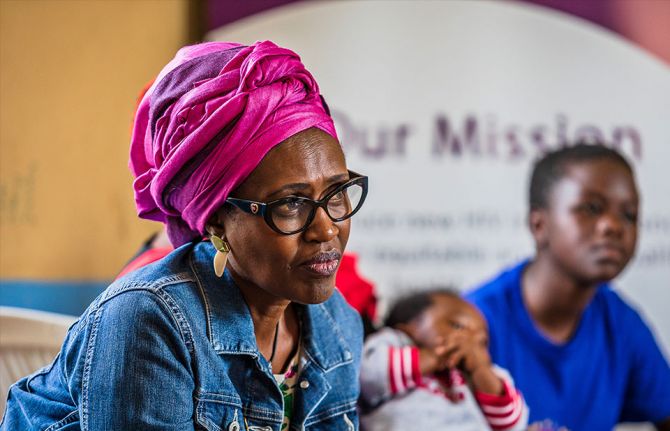
Opinion
Successful global epidemic responses put people at the centre
12 March 2020
12 March 2020 12 March 2020The COVID-19 outbreak is rightly shining a light on international and national responses to health emergencies—exposing gaps in our systems, showing our strengths and drawing on the valuable experience of responding to other health threats, such as HIV. At UNAIDS, we know that people living with HIV will have some anxiety and questions about the emergence of the virus that causes COVID-19. One of the most important lessons to be drawn from the response to the HIV epidemic is to listen and learn from the people most affected. UNAIDS continues to do so.
It’s important to underline that there is currently no strong evidence that people living with HIV are at an especially increased risk of contracting COVID-19 or, that if they do contract it, they will experience a worse outcome. As in the general population, older people living with HIV or people living with HIV with heart or lung problems may be at a higher risk of getting the virus and of suffering more serious symptoms. As for the general population, people living with HIV should take all recommended preventive measures to minimize exposure and prevent infection. As COVID-19 continues to spread around the world, it will be important for ongoing research in settings with a high prevalence of HIV in the general population to shed more light on the biological and immunological interactions between HIV and the new coronavirus.
But legitimate measures to contain the virus may have unintended adverse effects on people living with HIV. When the COVID-19 outbreak began in China, UNAIDS conducted a survey of people living with HIV to listen to their needs. A follow-up study has shown that some people living with HIV are beginning to experience challenges in receiving medicine refills. This is leading to some anxiety. In response, UNAIDS has been working with networks of people living with HIV and government officials to support special deliveries of medicines to designated pick-up points. A hotline has been established in China so that people living with HIV can continue to express their concerns while the outbreak persists. With our partners, we will also be closely monitoring developments in global supply chains to ensure that essential medical supplies continue to reach the people who need them and that disruptions to the manufacture of active pharmaceutical ingredients are kept to a minimum.
UNAIDS calls upon countries preparing their COVID-19 responses to ensure that people living with HIV have reliable access to their treatment medications. It’s now urgent that countries fully implement current HIV treatment guidelines from the World Health Organization for multimonth dispensing, ensuring that most people living with HIV are given three months or more of their medications. This will help to alleviate the burden on health facilities should COVID-19 arrive and allow people to maintain their treatment regimens uninterrupted without having to risk increased exposure to COVID-19 when retrieving their medicines.
A primary lesson from the AIDS response is that stigma and discrimination is not only wrong but counterproductive, both for an individual’s own health and for public health outcomes in general. That’s why UNAIDS has been supporting campaigns to reduce stigma and discrimination faced by people affected by COVID-19. We have never beaten a health threat through stigma and discrimination and our response to COVID-19 must be guided by lessons learned through the response to HIV. This includes listening to people affected by the outbreak and establishing trust and communication between people affected and health authorities, even before the disease burden rises.
Our biggest gains against HIV have come in countries that have reduced stigma and discrimination, encouraging people to test for the virus and to seek treatment if necessary. Using communication channels recommended by public health experts, let’s listen to people affected by COVID-19 and apply their lived experience so that we can strengthen our response to the virus.
The deaths caused by the COVID-19 outbreak are tragic and my thoughts go out to their families and loved ones. But if we are smart, the international community and individual countries will use this experience to further strengthen monitoring systems and make adequate investments in health infrastructure, both at the global and national levels. UNAIDS urges governments and health officials across the world not to delay in implementing public education programmes for all their citizens about the practical measures that should be taken to curtail the transmission and spread of the virus at the local level.
A people-centred approach is critical. Everyone must have the right to health—it’s our best defence against global epidemics.
Winnie Byanyima, UNAIDS Executive Director
Related information
Related

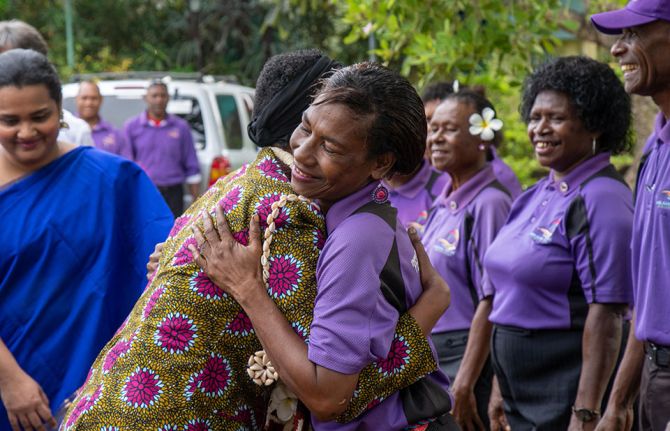
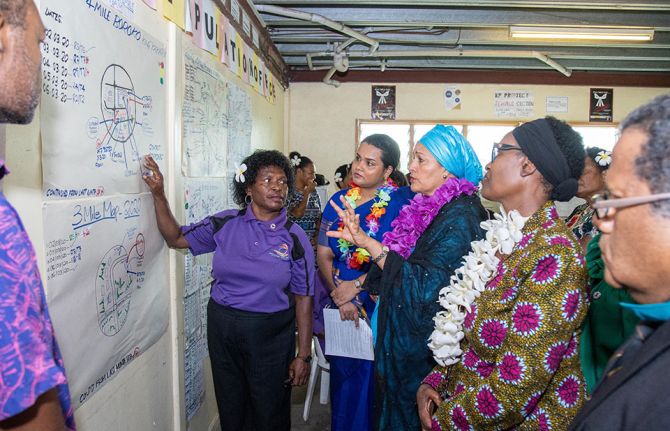
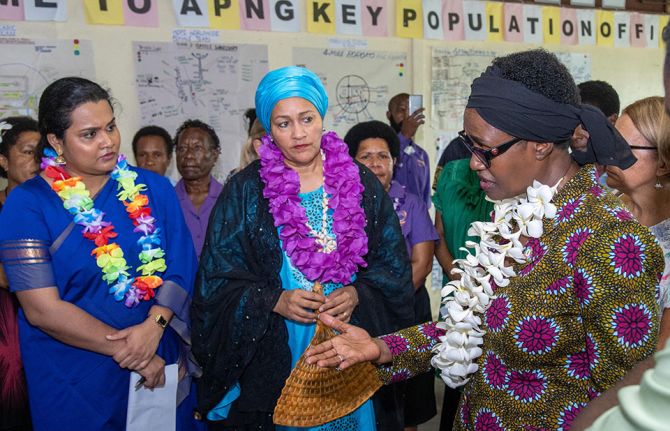
Feature Story
Getting HIV services to marginalized groups in Papua New Guinea
11 March 2020
11 March 2020 11 March 2020There are around 45 000 people living with HIV in Papua New Guinea, with marginalized groups, such as sex workers and other women who exchange sex for money, goods and protection, gay men and other men who have sex with men and transgender women, most affected. However, less than half of the people who belong to those vulnerable groups have ever taken a test to know their HIV status.
In November 2018, UNAIDS, the Global Fund to Fight AIDS, Tuberculosis and Malaria and other partners implemented a new outreach programme in the capital, Port Moresby, to try to reduce the impact of HIV among those groups of people by mapping the HIV epidemic and expanding HIV treatment and prevention services. Under the project, several outreach teams were created to promote and increase the uptake of testing and prevention services and to link people to HIV prevention and care services, if necessary.
By April 2019, the outreach teams had contacted 5000 people and tested 3000 of them for HIV, offering advice and support so that each person understood their test result.
“I like that we go to new places where people have never been offered an HIV test,” said a member of one of the outreach teams. “My motivation is meeting the young girls and taking care of them—making sure they take their medication.”
The outreach workers sometimes face harassment while conducting their work and change out of their official uniforms and into their own clothes so that people feel more comfortable talking to them. But the outreach workers find the work deeply rewarding.
“I have lost friends to AIDS, so that keeps me doing this work,” said another of the outreach workers. “It makes me work extra hard not to see someone else lost to this disease.”
The outreach teams are led by members of marginalized groups, an essential part of establishing community trust and engagement. In addition, leaders offer coaching, support and advice to field workers on a daily basis in order to ensure that their activities are as effective as possible.
The outreach programme is saving lives. Another of the outreach workers recalled his work with a transgender person, who he persuaded to try medication after testing positive for HIV.
“He told me that because he is transgender, he will only talk to a friend and that when he saw me, he knew I was a friend. Later, he brought in his companion to take a test.”
“This is a model of what can be achieved when we put our trust in community-led HIV services and programmes,” said Winnie Byanyima, UNAIDS Executive Director, in discussion with the outreach workers during her visit to Papua New Guinea with the United Nations Deputy Secretary-General, Amina Mohammed. “These outreach workers are heroes and they are saving lives.”
The outreach programme is also cost-effective and is projected to save hundreds of thousands of dollars over the next two years.
Region/country
Documents
Sixty-third session of the Commission on Narcotic Drugs (CND) — 2–6 March 2020 | Vienna, Austria
04 March 2020
At a time when we should be entering the last mile in the decade of action for the SDGs, UNAIDS highlights with urgent concern that the HIV epidemic among people who use drugs is still increasing. Worldwide, 14% of the 12 million people who inject drugs are living with HIV. The risk of acquiring HIV for people who inject drugs is 22 times higher than for those who do not. In many countries, the quality, coverage and funding for HIV programmes among people who inject drugs is deteriorating. This is not just a worrying trend. This is a public health emergency.

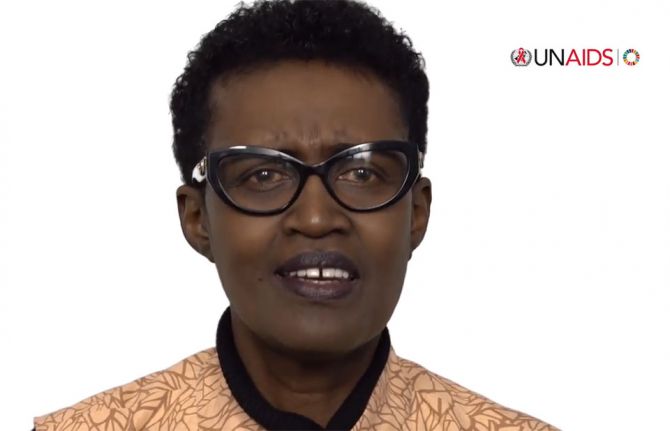
Press Statement
Message from the UNAIDS Executive Director on Zero Discrimination Day and International Women’s Day
01 March 2020 01 March 2020As the Executive Director of UNAIDS, I lead the work of the United Nations to tackle AIDS. I’m also someone who has lost family members to AIDS. This is personal.
Both my own family experience and our collective experience at the United Nations have highlighted the same key lesson: the struggle to beat AIDS is inseparable from the struggle for women’s rights and from the struggle against all forms of discrimination.
AIDS can be beaten, but it will only be beaten if we take on the social and economic injustices that perpetuate it and spur more scientific innovations to address the real needs of women and girls and people living with and vulnerable to HIV.
Worldwide, AIDS remains the biggest killer of women aged 15–49 years. To end AIDS by 2030, we must end gender-based violence, inequality and insecurity and we must ensure that women and girls have equal access to education, health and employment.
We need to transform our societies so that no one is second class and everyone’s human rights are respected. AIDS cannot be beaten while marginalized communities, including lesbian, gay, bisexual, transgender and intersex people, people who inject drugs and sex workers, live in fear of the state or of socially sanctioned violence and abuse.
Beating AIDS depends on tackling all forms of discrimination.
I want to thank all the brave and determined social justice movements who are the true leaders in this work.
I salute you.
Feminism, human rights and zero discrimination are values deeply rooted across the world: they express our humanity, our recognition that I am because you are. And they are central to the struggle to beat AIDS.
Let us beat AIDS. It can be done.
Executive Director of UNAIDS

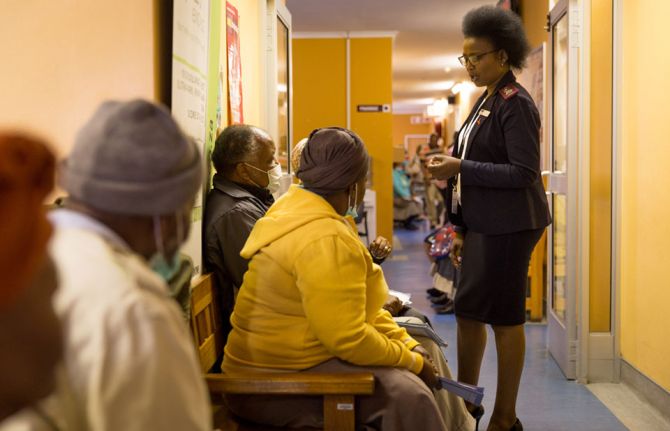
Press Release
Health should not be a privilege for the rich—the right to health belongs to everyone
20 January 2020 20 January 2020Gaps in public financing for health can be met by eliminating tax dodging and implementing progressive taxation; health and development must be protected from the growing impact of debt
DAVOS/GENEVA, 21 January 2020—UNAIDS is calling on governments to ensure that the right to health is realized by all by prioritizing public investments in health. At least half of the world’s population cannot access essential health services. Every two minutes a woman dies while giving birth. Among the people being left behind are women, adolescents, people living with HIV, gay men and other men who have sex with men, sex workers, people who inject drugs, transgender people, migrants, refugees and poor people.
“The right to health is eluding the poor and people trying to lift themselves out of poverty are being crushed by the unacceptably high costs of health care. The richest 1% benefit from cutting-edge science while the poor struggle to get even basic health care,” said Winnie Byanyima, Executive Director of UNAIDS.
Nearly 100 million people are pushed into extreme poverty (defined as living on US$ 1.90 or less a day) because they have to pay for health care, and more than 930 million people (around 12% of the world’s population) spend at least 10% of their household budgets on health care. In many countries, people are denied health care or receive poor quality health care because of unaffordable user fees. Stigma and discrimination denies poor and vulnerable people, especially women, their right to health.
Every week, 6000 young women around the world become infected with HIV. In sub-Saharan Africa, four out of five new HIV infections among adolescents are among adolescent girls and AIDS-related illnesses are the biggest killer of women of reproductive age in the region. Despite significant progress in reducing AIDS-related deaths and new HIV infections, there were 1.7 million new HIV infections in 2018 and nearly 15 million people are still waiting to receive HIV treatment.
“Publicly financed health care is the greatest equalizer in society,” said Ms Byanyima. “When health spending is cut or inadequate, it is poor people and people on the margins of society, especially women and girls, who lose their right to health first, and they have to bear the burden of caring for their families.”
Delivering health care for all is a political choice that too many governments are not making. Thailand has reduced mortality rates for children under the age of five years to 9.1 per 1000 live births, while in the United States of America the rate is 6.3 per 1000 live births, even though Thailand’s gross domestic product per capita is about one tenth of that of the United States. Thailand’s progress has been achieved through a publicly financed health-care system that entitles every Thai citizen essential health services at all life stages and leaves no one behind.
South Africa had just 90 people on antiretroviral therapy in 2000, but in 2019 had more than 5 million on HIV treatment. South Africa now has the largest HIV treatment programme in the world. Countries such as Canada, France, Kazakhstan and Portugal have strong publicly financed health systems, yet some other richer countries do not.
Health investments in many countries remain very low compared to their gross domestic product. The United Nations Conference on Trade and Development estimates that developing countries lose between US$ 150 billion and US$ 500 billion every year owing to corporate tax avoidance and profit shifting by big companies. If this lost money were invested in health, health expenditure could triple in low-income countries and could double in lower-middle-income countries. The race to the bottom on corporate tax cheats denies developing countries of much needed revenue and robs ordinary people of vital health services. The countries of the Economic Community of West African States lose an estimated US$ 9.6 billion each year to numerous tax incentives.
“It is unacceptable that rich people and big companies are avoiding taxes and ordinary people are paying through their ill health,” said Ms Byanyima. “Big companies must pay their fair share of taxes, protect employee rights, provide equal pay for equal work and provide safe working conditions for all, especially women.”
Debt is posing a serious threat to Africa’s economy, health and development, resulting in big cuts in social spending to ensure debt repayment. According to the International Monetary Fund, as of April 2019 half of low-income countries in Africa were either in debt distress or at a high risk of being so. Beyond low-income countries, in Zambia there was a 27% drop in health-care investments and an increase of debt servicing by 790% between 2015 and 2018. Similar trends were seen in Kenya, where debt servicing increased by 176% and health investments declined by 9% between 2015 and 2018. “There is an urgent need to manage debt in ways that protects people’s health. That means ensuring new financing focuses on social investments, debt repayments being halted for a period if needed to allow economic recovery and debt restructuring under a coordinated mechanism to protect spending on HIV, health and development,” said Ms Byanyima.
A major factor of ill health is the denial of human rights. According to the World Bank, more than one billion women lack legal protection against domestic violence and close to 1.4 billion women lack legal protection against domestic economic violence. In at least 65 countries, a same-sex sexual relationship is a crime. In recent years in some countries, crackdowns and restrictions on lesbian, gay, bisexual, transgender and intersex people have increased. Sex work is a criminal offence in 98 countries. Forty-eight countries and territories still maintain some form of HIV-related restrictions on entry, stay and residence. A recent study of sex work policies in 27 countries concluded that those that decriminalized some aspects of sex work have significantly lower HIV prevalence among sex workers.
In 91 countries, adolescents require the consent of their parents to take an HIV test and in 77 countries they require the consent of their parents to access sexual and reproductive health services, creating barriers to protect young people from HIV infection. One of the consequences of this is that the HIV incidence rate among young women and girls in eastern and southern Africa is twice that of their male peers.
“In the next decade, we can end AIDS as a public health threat and achieve universal health coverage. Governments must tax fairly, provide publicly funded quality health care, guarantee human rights and achieve gender equality for all—it is possible,” said Ms Byanyima.
UNAIDS is participating in several events at the 2020 World Economic Forum Annual Meeting in Davos, Switzerland, to highlight the need for governments to fulfil their commitments to realize universal health coverage and ensure that no one is left behind.
UNAIDS
The Joint United Nations Programme on HIV/AIDS (UNAIDS) leads and inspires the world to achieve its shared vision of zero new HIV infections, zero discrimination and zero AIDS-related deaths. UNAIDS unites the efforts of 11 UN organizations—UNHCR, UNICEF, WFP, UNDP, UNFPA, UNODC, UN Women, ILO, UNESCO, WHO and the World Bank—and works closely with global and national partners towards ending the AIDS epidemic by 2030 as part of the Sustainable Development Goals. Learn more at unaids.org and connect with us on Facebook, Twitter, Instagram and YouTube.
Press centre
Download the printable version (PDF)

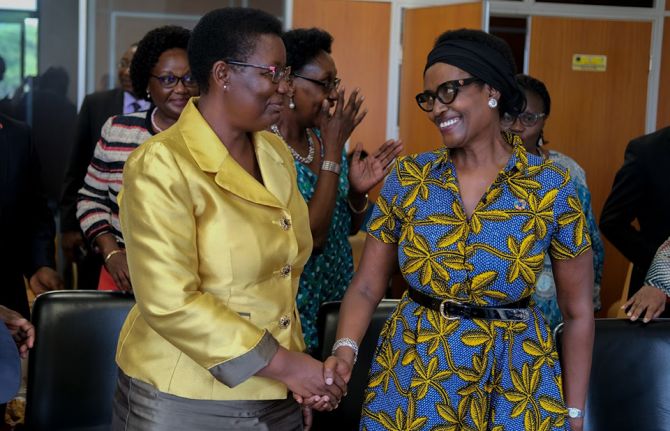
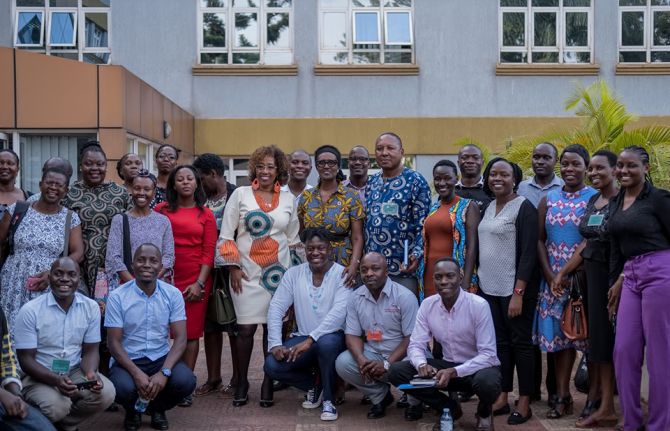
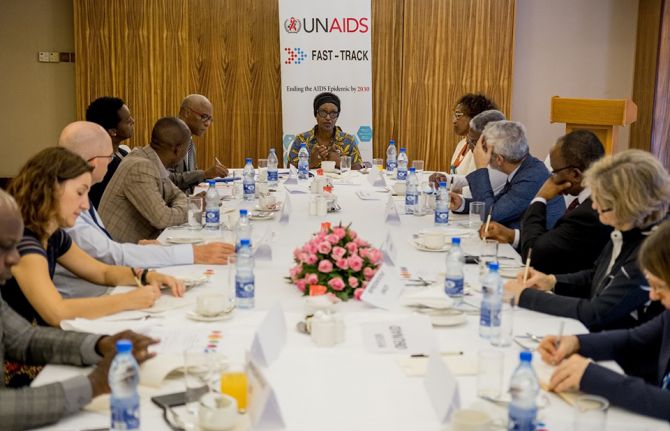
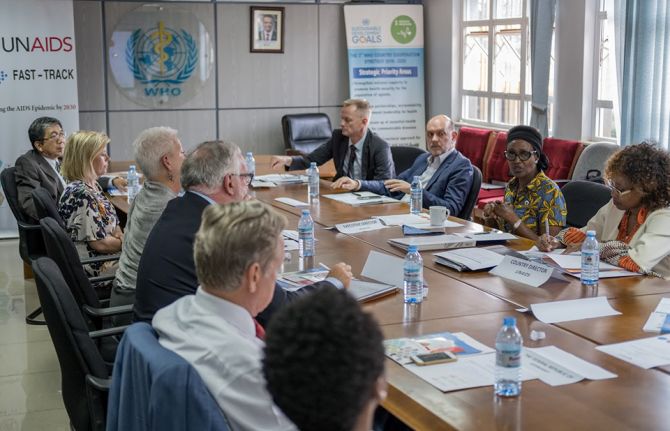
Feature Story
UNAIDS Executive Director urges Uganda to do more domestically
09 January 2020
09 January 2020 09 January 2020The new Executive Director of UNAIDS, Winnie Byanyima, has visited the country of her birth, Uganda, on a working visit.
During her meeting with the Minister of the Presidency, Esther Mbayo, she commended the efforts of the President of Uganda, Yoweri Museveni, in the response to HIV. She highlighted the US$ 7 billion funding gap in the global AIDS response, saying more needs to be done domestically. “Today, Uganda has 93% of the AIDS response funded externally,” she said. “Our friends are the ones keeping us alive, but we cannot depend on them forever.”
She added that many African countries, including Uganda, will soon become middle-income economies and therefore will receive less international aid. Throughout the day she reiterated the same message to United Nations staff, stakeholders and partners―find ways to overcome stagnating levels of funding and reduce financial waste, inefficiencies and corruption.
Ms Byanyima also emphasized the need to focus on women and girls in Africa. “More needs to be done to rectify gender inequalities and end gender-based violence,” she said.
In eastern and southern Africa, girls and young women are two times more likely to acquire HIV than their male counterparts. In Uganda, overall HIV prevalence stands at 5.7% and 34% of new infections are among young people aged 15–24 years.
She also noted that Uganda should not waiver in protecting the human rights of everyone, and should drop the current law on same-sex sexual relationships. She said that governments should not discriminate, saying that gay men and other men who have sex with men and sex workers should not be denied access to health care.
During a meeting with civil society, Ms Byanyima encouraged them to speak up, telling them “You are the voice of citizens and you should hold government and others accountable.”
Region/country
Related

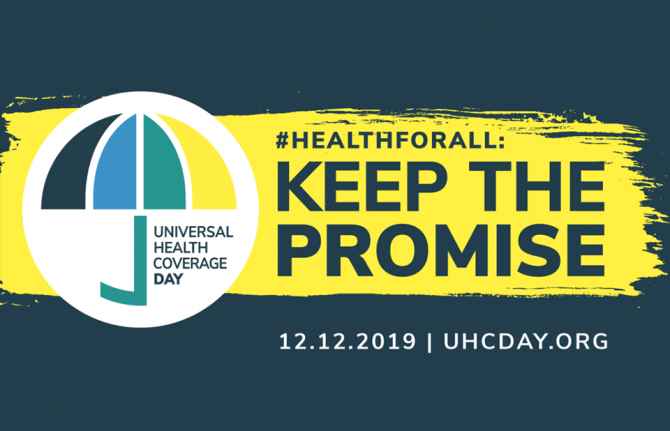
Press Statement
UNAIDS Executive Director's message on Universal Health Coverage Day
12 December 2019 12 December 201912 December 2019
On Universal Health Coverage Day, I stand in solidarity with all people who lack access to the health services that they need. Today, 10 000 of those people will die. Every two minutes, a woman will die giving birth. And every second, three people will be pushed into extreme poverty paying for health care. Today, those with the greatest need for health care are the least likely to get it. This must change, and it must change fast.
Universal health coverage is a human right that belongs to everyone on this planet. No matter who they are or where they live, everyone has the right to access quality health services without facing financial hardship. This was the historic commitment made by United Nations Member States in the political declaration made at the first-ever high-level meeting on universal health coverage last September.
Universal health coverage is central to our time and to the AIDS response, because better health outcomes are, first and foremost, about addressing inequities. Evidence that health coverage has truly become universal will be in improved health and in the elimination of the unacceptable inequality in health outcomes for the most marginalized populations. It will be the day when no parent has to make a choice between which child they will save because the cost of treatment is too high.
Each year, 100 million people are pushed into extreme poverty and 900 million face severe financial hardship paying for their health care. Despite commitments to bring these figures down, alarmingly they are on the rise. The fastest increase is in Africa, where two thirds of countries still charge user fees for all levels of care. This must change. User fees trap people, especially women and children, in cycles of poverty, illness and powerlessness. It is an injustice to force people to choose between paying for food, education or the health services they need. It is a human rights violation to detain patients in hospitals when they can’t afford their bill. Universal health coverage must lift the financial barriers to accessing health care. To ensure that rights are upheld and lives are saved, quality health care should be made available at the point of use for all people.
But universal health coverage needs also to go beyond the health sector, to address the social, economic and structural determinants of health, such as poverty, lack of formal education, gender inequality and gender-based violence. Similarly, it must ensure that vulnerable and key populations are not excluded from accessing health services owing to legal barriers or stigma and discrimination because of who they are.
The AIDS response has taught us that community-led organizations are central to any effective health system. A few days ago, we commemorated World AIDS Day with a call to recognize that communities make the difference. If today more than 24 million people have access to HIV treatment, it is first and foremost thanks to the work of those communities to advocate, deliver services and hold systems accountable.
For universal health coverage to achieve measurable health outcomes, it must fund and include community-led services. Communities need to be at the centre, involved in each step of health governance, planning, implementation, monitoring, reporting and research.
In recognizing the theme of this year’s Universal Health Coverage Day, “Keep the promise”, I call on governments and communities to keep up the momentum generated by the commitment in the political declaration and work together to advance equitable quality health services that reach the people in need and improve their well-being. This will be essential to both ending AIDS and the achievement of the Sustainable Development Goals.
Winnie Byanyima
Executive Director of UNAIDS
Under-Secretary-General of the United Nations
UNAIDS
The Joint United Nations Programme on HIV/AIDS (UNAIDS) leads and inspires the world to achieve its shared vision of zero new HIV infections, zero discrimination and zero AIDS-related deaths. UNAIDS unites the efforts of 11 UN organizations—UNHCR, UNICEF, WFP, UNDP, UNFPA, UNODC, UN Women, ILO, UNESCO, WHO and the World Bank—and works closely with global and national partners towards ending the AIDS epidemic by 2030 as part of the Sustainable Development Goals. Learn more at unaids.org and connect with us on Facebook, Twitter, Instagram and YouTube.
Contact
UNAIDS GenevaAnne-Claire Guichard
tel. +41 22 791 2321
guicharda@unaids.org
UNAIDS Media
tel. +41 22 791 42 37
communications@unaids.org
Learn more about
Press centre
Download the printable version (PDF)






